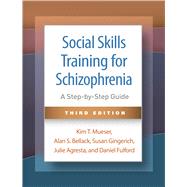
Social Skills Training for Schizophrenia A Step-by-Step Guide
by Mueser, Kim T.; Bellack, Alan S.; Gingerich, Susan; Agresta, Julie; Fulford, Daniel; McGorry, Patrick D.Buy New
Rent Textbook
Used Textbook
We're Sorry
Sold Out
eTextbook
We're Sorry
Not Available
How Marketplace Works:
- This item is offered by an independent seller and not shipped from our warehouse
- Item details like edition and cover design may differ from our description; see seller's comments before ordering.
- Sellers much confirm and ship within two business days; otherwise, the order will be cancelled and refunded.
- Marketplace purchases cannot be returned to eCampus.com. Contact the seller directly for inquiries; if no response within two days, contact customer service.
- Additional shipping costs apply to Marketplace purchases. Review shipping costs at checkout.
Summary
New to This Edition
*Chapters on specific populations: SST with young people with high clinical risk or first-episode psychosis, older individuals, and those in residential or inpatient settings.
*Chapters on cultural factors in SST; gender, sexual identity, and sexual harassment; and technology-based communication.
*Three additional curricular areas--technology-based communication, school, and problem solving--for a total of 26 more skills than the prior edition.
*Many new reproducible and downloadable tools.
Author Biography
Alan S. Bellack, PhD, ABPP, until his retirement in 2013, was Professor of Psychiatry and Director of the Division of Psychology at the University of Maryland School of Medicine and Director of the VA Capitol Health Care Network Mental Illness Research, Education, and Clinical Center (MIRECC). In recognition of his lifetime research on psychosocial aspects of schizophrenia, he received the Alexander Gralnick Research Investigator Award from the American Psychological Foundation, among other awards. Dr. Bellack is coauthor or coeditor of more than 190 journal articles, 30 books, and 46 book chapters in the areas of schizophrenia, depression, social skills training, and substance abuse.
Susan Gingerich, MSW, is a social worker based in Philadelphia. Ms. Gingerich has worked with individuals with schizophrenia and their family members since the 1980s. She currently serves as Training Coordinator and a trainer for the NAVIGATE program for first-episode psychosis, which integrates social skills training with other treatment components. She received the Larry J. Seidman Award for Leadership from the Psychosis-Risk and Early Psychosis Program Network (PEPPNET). Ms. Gingerich is the coauthor of several books and multiple articles related to her research interests, which include social skills training, illness management and recovery, technology-based support for preventing relapses, family education and support, and training community mental health centers in evidence-based practices.
Julie Agresta, MEd, LCSW, is a licensed clinical social worker in private practice in Blue Bell, Pennsylvania. Since the 1990s, she has provided consultation services to community-based programs and agencies serving adults and children with mental health disorders and developmental disabilities. Ms. Agresta also provides therapy to children, adolescents, and adults. She is President of the Pennsylvania Society for Clinical Social Work.
Daniel Fulford, PhD, is a clinical psychologist and Associate Professor in the Department of Occupational Therapy and the Department of Psychological and Brain Sciences at Boston University. Dr. Fulford’s clinical and research interests include motivational and social impairments in serious mental illness; he often uses ambulatory methods, including the development and testing of digital therapeutics, in his work. He has been named a Face of the Future by the Society for Research in Psychopathology and was co-recipient of a Visionary Grant from the American Psychological Foundation. Dr. Fulford has published his work in top journals and serves as Associate Editor for several journals, including the Journal of Psychopathology and Clinical Science.
Table of Contents
I. Principles, Research, and Assessment
1. Schizophrenia, Social Skills, and Recovery
2. SST as an Evidence-Based Practice
3. Assessment
II. Teaching Social Skills
4. Methods for Teaching Social Skills
5. Starting an SST Group
6. Curricula for SST Groups
7. Tailoring Skills for Individual Needs and Goals
8. Solutions for Common Problems
III. Special Populations, Settings, and Needs
9. Co-Occurring Substance Use Disorders
10. Clinical High Risk and First Episode Psychosis
11. SST for Technology-Based Communication
12. Older Individuals
13. Inpatient and Residential Settings
14. Cultural Issues
15. Considerations for Gender and Sexual Identity and Social Skills Related to Sexual Harassment
IV. Curricular Skill Sheets for Group Leaders
- Four Basic Social Skills
- Conversation Skills
- Assertiveness Skills
- Friendship and Dating
- Dealing with Conflict
- Dealing with Substance Use Situations
- Education Skills
- Work Skills
- Technology-Based Communication
- Living with Other People
- Interacting with Healthcare Professionals
- Solving Problems
References
Index
An electronic version of this book is available through VitalSource.
This book is viewable on PC, Mac, iPhone, iPad, iPod Touch, and most smartphones.
By purchasing, you will be able to view this book online, as well as download it, for the chosen number of days.
Digital License
You are licensing a digital product for a set duration. Durations are set forth in the product description, with "Lifetime" typically meaning five (5) years of online access and permanent download to a supported device. All licenses are non-transferable.
More details can be found here.
A downloadable version of this book is available through the eCampus Reader or compatible Adobe readers.
Applications are available on iOS, Android, PC, Mac, and Windows Mobile platforms.
Please view the compatibility matrix prior to purchase.
